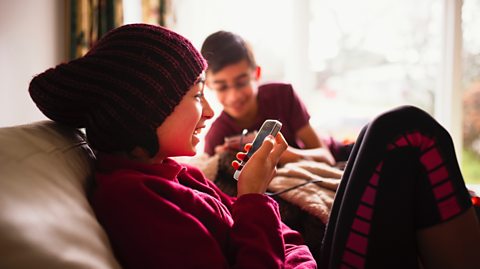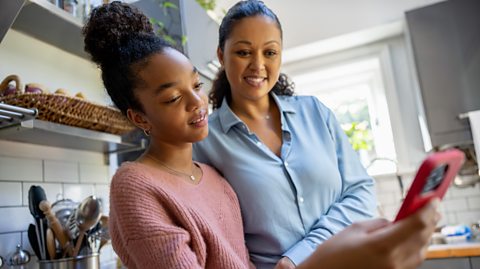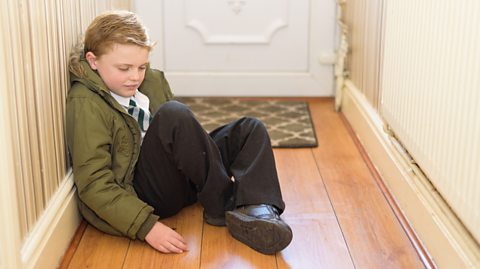As parents, it’s almost an inevitable question of when - not if - your child will get a mobile phone. According to a 2023 Ofcom report, more than half of eight to eleven-year-olds across the UK own a mobile phone. At ages 12 to 15, 98% of children own a mobile phone.
Often, if your child doesn’t already own a phone, the obvious time to get one is in preparation for them starting high school.
But where do you begin when assessing which phone to get, what kind of contract, how much to spend and what to allow your child to do on that phone?
To help you navigate these decisions, BBC Bitesize Parents’ Toolkit has put together a list of five things to consider when buying your child a mobile phone.
1. What do you want your child to do with their phone?

“The first thing you should consider when buying a phone for your child is how it will be used. - Natalie Hitchins
Natalie Hitchins is Head of Home Products and Services at Which? - a consumer advice company. She says: "Whether it's a mobile phone for emergencies with a mammoth battery life or a smartphone with fast internet, a good camera and some apps, the first thing you should consider when buying a phone for your child is how it will be used.”
Ask yourself: is the phone just for your child to call and text you when they’re out of the home? Do you want to be able to track where they are? Do you want them to be able to access the internet and/or apps? What about gaming, social media and group chats – what kind of things do you want to enable them to do on their phone?
Once you’ve answered your own questions, speak to your child about their expectations: what do they want to be able to do with their phone? What kind of phone are their friends getting? If your child is expecting the latest smartphone or lots of data, are they prepared to contribute a percentage of their pocket money towards it?
2. How can you budget for the phone?

Phones can be costly, so go back to the question of why you’re getting your child a phone. Be honest with them about your budget and the options available.
You can buy a simple mobile phone for making calls, texts and browsing the internet. They usually have a good battery life and can cost between £5 and £200. If you want internet connection, it’s probably worth getting a phone with 4G both for speed and also because mobile phone companies are phasing out 2G and 3G.
Smartphones are more expensive. Natalie from Which? says they’ve found “good options for children which range between £200 and £400”. You could save money by buying a refurbished phone, or by repurposing one of your old mobile phones. If sustainability is important, you can also buy eco-friendly phones at a similar price to other smartphones.
Often a child will inherit their first phone from a parent or sibling. Rebecca is a parent of three from Burton-on-Trent. She says that when it was time to upgrade her own phone she bought her 11-year-old a new smartphone as her main birthday present and Rebecca kept her old phone. This made it cheaper - and they have a family contract with a large telecommunications company, to get slightly better value for money.
Matthew in Derby says he got his 13-year-old a “reasonably good smartphone” when she was in Year 6: “Not one of the newer models but it was a three-year contract with a reasonable amount of data.”
Natalie Hitchins says: “It’s almost always cheaper overall to buy [the phone] outright and take out a SIM-only deal, rather than entering a contract, but check the tariff to see if you'll be paying for extras that your child won't need.”
You can set a cap on overspending on many mobile contracts, or using pay-as-you-go means your child can only spend a set amount on the phone. You’ll need to consider how much data you might need – especially if you’re allowing your child to send pictures and videos whilst they’re out of the house and not using wi-fi!
3. What technical things should you consider?
Think again about what you want the phone to do. For example, how important is it that your child has a good camera on their phone?
Here’s a quick guide to some of the specs, based on us rounding up the opinions of several popular review sites:
- MP is megapixel count, and anything over 5 MP should be fine for photos
- storage comes in GB (gigabytes) and for a simpler phone can be around 4GB, but for smart phones is usually offered at 32GB or 64GB, or more!
- a 720p HD screen or above is good enough for watching videos and playing games
- battery life of 2,000 mAh or above should keep your child’s phone powered all day, though many smartphones aimed at children offer 4,000 mAh
- RAM (random access memory) is a smartphone’s short-term memory. 2GB of RAM is ok for simple phone use, or consider 4GB for multi-tasking.
With all of the above specs, you can opt for higher but it will also cost you more!
4. What do you do with the phone once you’ve got it?

“Don’t simply hand over the device – take some time to make sure you set up the device in an age-appropriate way. - Ghislaine Bombusa
It’s your choice whether to set any parental controls or restrictions, but it’s the next thing to consider when you give your child their first phone.
Ghislaine Bombusa, Head of Digital at charity Internet Matters, says: “Don’t simply hand over the device – take some time to make sure you set up the device in an age-appropriate way, including putting parental controls on your home broadband, and setting up either Google Family Link or Apple Screen Time, depending on your choice of Android or iOS device.”
Internet Matters has step-by-step guides for different phone models that you can use to help you set up restrictions on things like social media, in-app purchasing and photo-sharing.
Then there’s the discussion with your child about acceptable phone use and online safety. This Parent’s Toolkit guide can help you start that conversation and BBC Own It has advice for parents around online safety.
Ghislaine Bombusa says: “This is a great moment to agree on some simple rules to give [your child] the confidence to use it safely in and out of the home… If your child is taking the phone with them to school, make sure you know your school’s policy about mobile phone usage. Encourage them not to use the phone in the street for road safety and crime prevention reasons - it would be heartbreaking to see their new phone stolen from them - or dropped!”
Matthew also uses location tracking on his 13-year-old’s phone “to know where she is at all times”, or you can ask your child to voluntarily share their location when they’re out, via an app or messaging service.
5. How to keep the conversation going about your child’s phone use

Ghislaine Bombusa advises having “regular conversations” with your child about spotting risks online and what to do in certain situations, like “receiving friend requests from people they don’t know.” As your child matures and engages with social media, it’s important to have conversations around how to build healthy relationships online, as well as how to think critically, recognise ‘fake news’ and gauge the accuracy of online content.
Ghislaine adds: “Make sure your child understands everything they say, share or do online can be hard to remove, so it’s best to only put things out there they would want everyone to see.”
You also need to agree on screen-time boundaries as a family. Some parents even draw up a contract which covers things like when and where the phone can be used, who pays for breakages and even online behaviour.
However you decide to manage your child’s mobile phone use, try and keep the conversation going and regularly re-evaluate what they can and can’t do.

Further support:
In this Bitesize article, Head teacher and star of Educating Yorkshire, Mr Burton gives students advice on how to stay safe online.
BBC Own It has advice for parents to help their child to have positive experiences online.
UK Safer Internet Centre are the not-for-profit charity organisation behind Safer Internet Day. They have a guide for parents and carers around mobile phones.

More from BBC Bitesize Parents' Toolkit…
Parents' Toolkit
Fun activities, real-life stories, wellbeing support and loads of helpful advice - we're here for you and your child.

How to manage your child’s online world without clashing
Children and teens spend lots of time online for school and leisure, which can be a worry for parents. Here's some advice on managing your child’s screen time.

Michael Mosley: Five tips for helping your kids sleep well
Dr Michael Mosley offers advice on improving health and concentration through better sleep habits. Here are his tips for parents to help their kids.

School anxiety and refusal: How to help your child get through tough times
Tips to help parents understand emotionally-based school avoidance and offer support to their child.

How to tackle anxiety with Dr Anna
Calming techniques to help parents and children manage their anxiety.

Five tips to support the after-school ‘meltdown’
Expert advice on how to cope with after-school restraint collapse as a parent.
